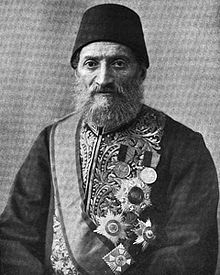Kıbrıslı Mehmed Kamil Pasha
|
Kıbrıslı Mehmed Kâmil Pasha |
|
|---|---|
 |
|
| Grand Vizier of the Ottoman Empire | |
|
In office 25 September 1885 – 4 September 1891 |
|
| Monarch | Abdul Hamid II |
| Preceded by | Mehmed Said Pasha |
| Succeeded by | Ahmed Cevad Pasha |
|
In office 2 October 1895 – 7 November 1895 |
|
| Monarch | Abdul Hamid II |
| Preceded by | Mehmed Said Pasha |
| Succeeded by | Halil Rifat Pasha |
|
In office 5 August 1908 – 14 February 1909 |
|
| Monarch | Abdul Hamid II |
| Preceded by | Mehmed Said Pasha |
| Succeeded by | Hüseyin Hilmi Pasha |
|
In office 29 October 1912 – 23 January 1913 |
|
| Monarch | Mehmed V |
| Preceded by | Ahmed Muhtar Pasha |
| Succeeded by | Mahmud Shevket Pasha |
| Personal details | |
| Born | 1833 Nicosia, Cyprus Eyalet, Ottoman Empire |
| Died | 14 November 1913 Nicosia, Protectorate of Cyprus, United Kingdom |
| Nationality | Ottoman |
| Political party | Freedom and Accord Party |
| Religion | Islam |
Mehmed Kâmil Pasha (Ottoman Turkish: محمد كامل پاشا; Turkish: Kıbrıslı Mehmed Kamil Paşa, "Mehmed Kamil Pasha the Cypriot"), also spelled as Kiamil Pasha (1833 – 14 November 1913), was an Ottoman statesman of Turkish Cypriot origin in the late 19th century and early 20th century, who became, as aside regional or international posts within the Ottoman state structure, grand vizier of the Empire during four different periods.
He was born in Nicosia in 1833, son of Captain Salih Ağa from the village of Pyrogi, in Cyprus. His first post was in the household of the Khedive of Egypt who at that time was only nominally dependent to the central Ottoman power in Constantinople. In the course of this appointment he visited London for the Great Exhibition of 1851 in charge of one of the Khedive's sons. Kiamil's sojourn in England left in him a lifelong admiration for Britain and during his career within the Ottoman state, he was always known to be an Anglophile.
Having full command of English, thenceforth to the close of his career he zealously sought the friendship of England for Turkey.
After remaining in Egypt for ten years, Mehmed Kamil exchanged the service of Abbas I for that of the Ottoman Government as of 1860 and for the ensuing nineteen years – that is to say until he first entered the Cabinet – he filled very numerous administrative appointments in every part of the Empire. He governed, or helped to govern provinces such as Eastern Rumelia, Hercegovina, Kosovo, and his native Cyprus.
...
Wikipedia
